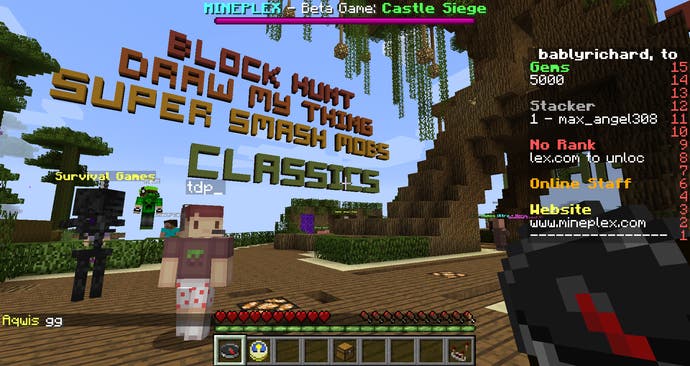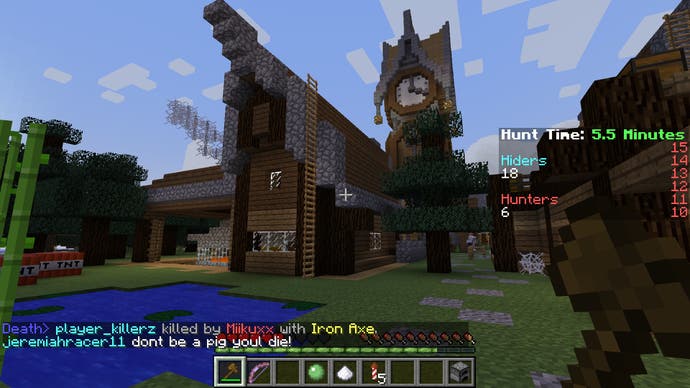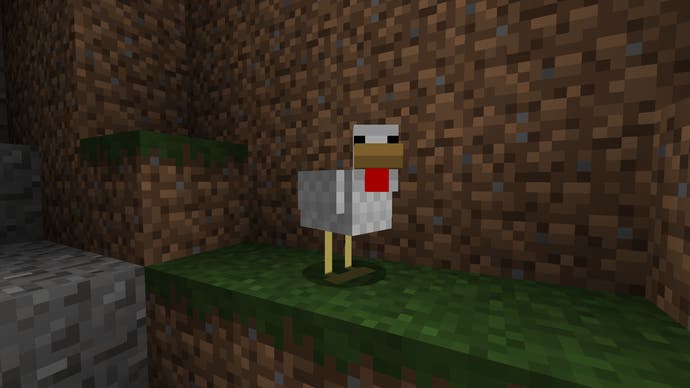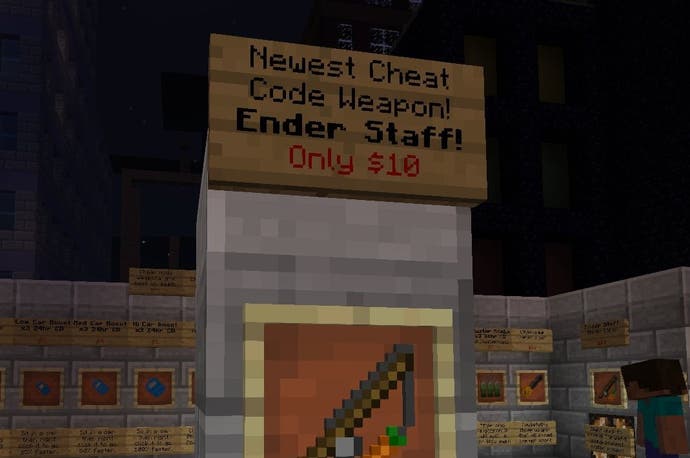Ending the Minecraft fantasy
Notch is right to clamp down on paid Minecraft servers, but at what cost?
I wonder if things would be different if we didn't all call him "Notch".
This week's Minecraft server controversy has been an interesting one, both for what the two sides are fighting for and why it feels a little different to most big blow-ups. The gist, in case you've missed it, is that Mojang has decided to get serious about its EULA and start enforcing the rule that server operators can no longer sell gameplay boosts for real-world cash. Cue online explosions, up to and including the claim that Mojang is now "worse than EA".
The main pushback of course comes from server operators, angry at this dam being built in their money stream, leaving no ways to support or monetise servers unless you count being allowed to charge for access, for priority access, to sell cosmetic items and ranks, to accept donations and to have advertising. Or, as it's technically known, a metric crapload more than you can do with pretty much any other game out there. Not that that counts for much.
"A network of servers require many dedicated servers, usually costing around $100-200/mo PER SERVER. One can not afford this along with a normal life (rent, food, etc)," explains one of the loudest voices from the forums. Well, too bad. It's this sliver of the community that's sent the cost of running Minecraft servers skyrocketing, as well as putting the emphasis onto exploitative tactics from the F2P playbook. This is neither Mojang's problem, nor its fault and it's hard to blame it for trying to push an egalitarian vibe for the game, especially given how likely it is that players will ultimately blame it directly if things go wrong.

There are definitely a few things that sit poorly, sure, like the timing of this coming hot on the heels of Mojang's own (far more limited) hosting service Minecraft Realms, and the fact that this will no more stop dodgy server operators than Blizzard's EULA and the MMO genre's finger-wagging has stopped the spread of player-run World of Warcraft shards. At heart though, this policy shift has always been a possibility that any server operator should have been aware of. Mojang's apathy was an incredible boon, but apathy is all it's ever been.
So why does all this still feel slightly odd?
Largely because, whatever the reason for it, it's a sharp reminder that underneath all the tweets, all the self-effacing talk about the best thing about being rich being not having to worry about shopping any more and all the whimsy, there's a business being run here. It's a bit like Charlie Bucket's first day at work, realising that along with the Chocolate Room and the Inventing Room, there's one somewhere full of Oompa Loompas filling out Income Tax Form #47b ("Oompa-Loompa, doopity-doo. Declare all your assets or it's prison for you.")
Mojang has always been something else; the company that unlocked the gaming world's creativity, that regularly poked at big business. We routinely call Markus Persson "Notch" and for that and other reasons, he can't help but feel 'one of us' in a way that no other developer right now can claim - the guy who initially faced Bethesda's guns over the name "Scrolls" by suggesting the two companies fight it out in Quake 3, dropped plans to work with the Oculus Rift due to fears of what Facebook might to do it, and recently got the kind of coverage most developers can only dream of simply by spending two hours knocking out a dumb joke game about a horse. The same Notch talking about EULAs and lawyers doesn't fit that playful narrative. It's like being threatened with a restraining order by your teddy bear.
It's also another painful reminder of the boundaries of both creativity and freedom in modern gaming - the exact specifics of what Mojang is trying to enforce are less relevant than its attempt and ability to enforce them. Minecraft is after all in an unusual position that while it's Mojang's game, it's the players' worlds. More than that. Universes. A combination of modding and self-hosted servers have turned it from a game into a gaming platform that nothing else comes close to. If you build something cool in Everquest Landmark, you know from the moment that you place the first voxel that you're doing it in Sony's sandbox. In, say, Second Life, no amount of scripting and clever design is ever going to overshadow the truth Linden Lab is both god and landlord of its one-time Metaverse.

In Minecraft though, there's a real sense of freedom and ownership, whether it's a few friends getting together to build houses and/or giant willies, or a huge sprawling world of mini-games and massive communities - at the time of writing, Mineplex boasted 5586 players online. Mojang flexing its muscles is a reminder though that, legally at least, all this freedom is illusory. Whether the reasons are justified or not, or even whether they affect many players at all, that's a good reason to get upset. No king or queen or emperor or even democratically elected ruler wants to be reminded that at best their empire is a vassal state in the great scheme of things, or that "But we spent a lot of time and money!" carries no more weight here than when someone's dream house gets bulldozed by the council for having been built without planning permission. Knowing the score is one thing. Having it hammered home is another entirely.
The tragedy is that without a few bad seeds, it seems unlikely that Mojang would have bothered stepping things up in the first place. Playing Wac-A-Mole with server operators is going to be a pain in the neck come the August deadline, in terms of the futility of it, the need to be seen to be serious so that future ultimatums will carry any weight and the continued bad will it's going to generate. There's no point targeting servers nobody cares about, but by definition the ones worth chasing have big populations of players who are committed to both their continued survival and the worth of everything they've bought and accumulated so far. Nothing gets a person riled up quite like threatening to destroy their home, virtual or not.
Whether this latest chapter of the Minecraft story ends up being the right call or not though, it should stand as a sobering reminder of a thing that's as obvious as it is easily forgotten - that if you don't actually own a thing, then everything you do with it is ultimately at someone else's pleasure. Notch is likely no more your pal than Shigeru Miyamoto is ever going to be, he just tweets more, and Mojang's first responsibility will always be to itself. That's true whether or not you take a dark view of Persson and his company's decisions, or consider him a saint and their first question in every meeting "What is the best thing we can possibly do here?" And it's true not because of cynicism, but because that's unfortunately the only way any company of that level can afford to be these days, but especially in cases where money can even seem to be changing hands in its name, while being completely out of its control. (Persson mentions getting emails from parents demanding refunds on purchases from third-party servers. While he doesn't divulge the scale of the problem, its existence isn't remotely questionable.)

Ideally of course, everything will resolve itself naturally - that despite server owners' fears, their communities will step up to the plate to keep their worlds alive, much as players of everything from MUDs to games like Meridian59 and Neocron have proven able to keep the lights on. It's not like the F2P community is averse to buying cosmetic crap, and the only major thing that Mojang isn't allowing onto the market there are capes. There will be casualties, of course, but by and large the internet is better than you'd think about pitching in to help things that it cares about - on a grand scale, for charities and Kickstarters and whatever, and on much smaller-scale ones, as myself and others who've been experimenting with Patreon over the latest few months can gratefully attest. There may not be as much money in Minecraft after these changes, and many may need to downscale, but communities people care about do have a better chance of weathering the storm than it might seem.
For the future though, let it stand as a reminder that when it comes down to it, when all else is stripped away, the only guaranteed way to make money with Minecraft is to have created and own Minecraft. That's a difficult trick to pull off without access to a time machine, but it will also apply to whatever comes after it unless it comes fully open-sourced. Great as Nethack and friends are, that seems unlikely. Still, if the spurned server hosts here are looking for something to do with that free time threatening to open up, there are worse projects to consider. After all, if creating worlds is truly what they want to do...

